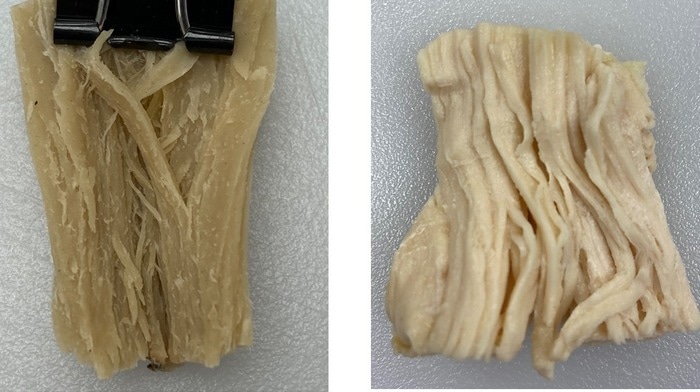Many people are now on board with the plant-based meat movement. Protein-rich plants, like soybeans, are common ingredients, but it is unknown how much of the nutrient gets absorbed in human cells.
 A meat substitute (left) resembles chicken meat (right), but its proteins are not absorbed as well by human cells. Image Credit: Adapted from Journal of Agricultural and Food Chemistry, 2022
A meat substitute (left) resembles chicken meat (right), but its proteins are not absorbed as well by human cells. Image Credit: Adapted from Journal of Agricultural and Food Chemistry, 2022
Studies reveal in the Journal of Agricultural and Food Chemistry of the American Chemical Society that proteins in a model plant-based replacement were not as available to cells like those from meat. According to the group, this understanding could ultimately be used to create more healthy products.
Just about any type of alternative meat, from ground beef to fish sticks, is now available to consumers. Plants are transformed into a powder and mixed with seasonings to imitate the glance and texture of the real meat. The mixtures are then usually heated, moistened, and passed on through an extruder. Since the plants used to create them are high in protein and low in unwanted fats, these products are often thought to be healthier than animal meats.
However, laboratory tests have revealed that proteins in substitutes do not degrade into peptides including those in meats. Osvaldo Campanella, Da Chen, and coworkers hoped to see if human cells could absorb the same amount of peptides from a model meat substitute that they could from a piece of chicken.
Using the extrusion process, the scientists have created a model meat substitute made of soy and wheat gluten. When the material was cut open, it revealed long fibrous pieces inside, similar to chicken. Cooked substitutes and chicken meat were powdered and broken down with an enzyme used by humans to digest food.
In vitro tests revealed that meat substitute peptides were less water-soluble than chicken peptides and were not as well engrossed by human cells. The next process, according to the researchers, is to distinguish other ingredients that could greatly enhance the peptide absorption of plant-based meat substitutes.
Source:
Journal reference:
Chen, D., et al. (2022) Characterization and Cellular Uptake of Peptides Derived from In Vitro Digestion of Meat Analogues Produced by a Sustainable Extrusion Process. Journal of Agricultural and Food Chemistry. doi.org/10.1021/acs.jafc.2c01711.